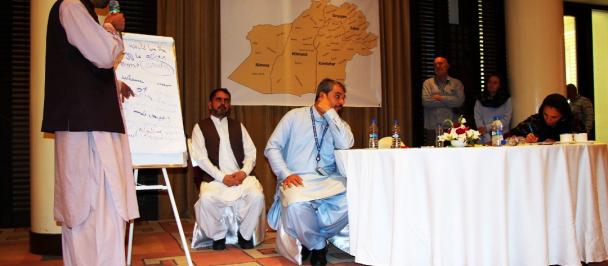This Environment and Social Management Plan (ESMP) was finalized for the Project. The purpose of the ESMP is to consider and develop adequate measures and controls to minimize and mitigate the potential environmental and social risks and impacts identified during the project implementation.
Environment and Social Management Plan (ESMP) - Executive Summary
July 18, 2022

The Non-Governmental Organizations (NGOs) and Civil Society Organizations (CSOs) Capacity Building Support Project in Afghanistan will enhance the capacity of non-governmental implementation partners in delivering quality basic services to the most vulnerable in the communities. The Project aims to target both operational NGOs to enhance basic service delivery, and CSOs especially, those that are women-led and advocate for women’s rights, as well as supporting and advocating for persons with disabilities. The Project will build capacity for a total of 400 NGOs and CSOs across the 8 regions and 34 provinces of Afghanistan. Implementation is planned for 24 months.
The United Nations Development Programme (UNDP) will implement the project, while the International Development Association (IDA) and the World Bank (WB), acting as the administrator of the Afghanistan Reconstruction Trust Fund (ARTF), have agreed to provide financing for the Project. This Environment and Social Management Plan (ESMP) has been developed for the Project. The purpose of the ESMP is to consider and develop adequate measures and controls to minimize and mitigate the potential environment and social risks and impacts identified during the project implementation.
The ESMP has been prepared in compliance with the World Bank’s Environmental and Social Standards (ESS) and UNDP’s Social and Environmental Standards (SES). This ESMP identifies environmental and social management measures to be implemented throughout the course of the Project and will be integrated into all contractual and responsible party agreements with partners involved in project implementation.
As per the risks and impacts identified, World Bank’s ESS1 (Assessment and Management of Environmental and Social Risk and Impacts), ESS2 (Labour and Working Conditions), ESS4 (Community Health and Safety) and ESS10 (Stakeholders Management and Information Disclosure) and UNDP’s SES Standard 3 (Community Health, Safety and Security) and Standard 7 (Labour and Working Conditions) will be relevant to the Project.
The ESMP includes the following management measures based on the risks and impacts identified,
- Labour Management Procedures entails an overview of the labor use of the Project, assesses the potential labor risks envisaged due to the project activities and suggest mitigation measures in relation to exposure of project workers to COVID – 19 and other infections, risks to Sexual Exploitation and Abuse (SEA), Sexual Harassment (SH) and Gender Based Violence (GBV), Non- Discrimination, Child Labour, Occupational Health and Safety and Grievances.
- SEA/SH Action Plan provides an overview of SEA/SH risks on the Project, the screening process adopted and activities proposed in areas of interventions related to awareness raising and monitoring, Gender Action Plan, Gender Focal Team system, recruitment and human resource management, Country Office Capacity Building Plan, mandatory training, reporting mechanisms, field monitoring, screening and vetting, pre-conditional/conditional grant approval and additional measures including ABADEI special measures and multi-stakeholder approach on PSEA, Women’s Human Rights and GBV, mahram system in place and physically segregating spaces.
- COVID-19 Infection Plan discusses the action plan to be adopted in terms of provisioning of adequate Personnel Protection Equipment, awareness trainings, record keeping and setting up of an anonymous process for workers to voice concerns about COVID-19-related hazards in view of the exposure of COVID-19 risks to the project workers, NGO network and PIU due to the project implementation phased.
- Security Management Measures details the security risks identified due to the project activities and action plan incorporating adoption of World Bank’s ESS Security Screening Checklist, Security Training and Capacity Development Statement, Security Audit Process, Security Incident Reporting Provisions, Crisis Management, Incident Management and Data Protection Management based on the risks identified.
- Negative List of Activities list the indicative list of activities that cannot be financed under the Project’s small grants components.
- Public Consultation, Communication and Information Disclosure provides an overview of the consultative activities planned to be undertaken with the stakeholders identified for the Project including the Information Disclosure process to be adopted to ensure transparency and accountability in line with World Bank ESS and UNDP SES standards. Link to the Stakeholder Engagement Plan developed for the Project is provided, https://www.undp.org/afghanistan/ngos-and-csos-capacity-support-project-afghanistan
Comments and feedback to the ESMP are welcome. Please get in touch with Communications.af@undp.org for questions or comments.

 Locations
Locations